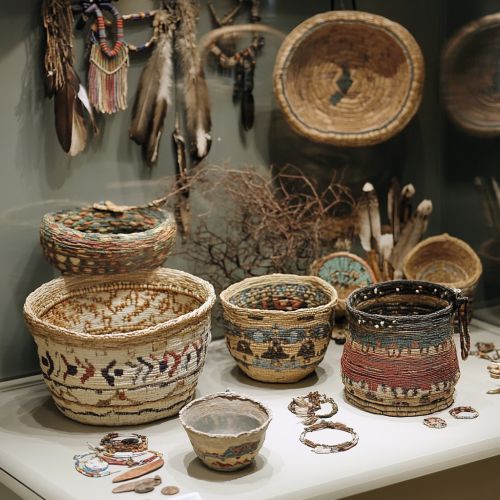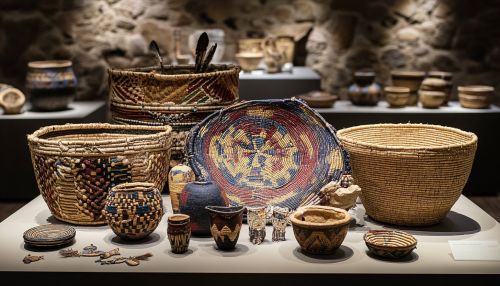Thaw Collection: Difference between revisions
(Created page with "== Overview == The Thaw Collection is an extensive and meticulously curated assemblage of historical artifacts, primarily focusing on Native American art and artifacts. This collection is renowned for its breadth and depth, encompassing a wide range of cultural and historical items that span various indigenous tribes and regions across North America. The collection is named after Eugene V. Thaw, a prominent art dealer and collector who dedicated much of his life to pres...") |
No edit summary |
||
| (One intermediate revision by the same user not shown) | |||
| Line 27: | Line 27: | ||
Native American jewelry, particularly from the Navajo and Zuni tribes, is another highlight of the Thaw Collection. The collection features exquisite examples of [[Turquoise jewelry|turquoise]] and silverwork, showcasing the exceptional craftsmanship and artistic expression of Native American jewelers. | Native American jewelry, particularly from the Navajo and Zuni tribes, is another highlight of the Thaw Collection. The collection features exquisite examples of [[Turquoise jewelry|turquoise]] and silverwork, showcasing the exceptional craftsmanship and artistic expression of Native American jewelers. | ||
[[Image:Detail-98019.jpg|thumb|center|Various Native American artifacts including baskets, pottery, and jewelry displayed in a museum setting.|class=only_on_mobile]] | |||
[[Image:Detail-98020.jpg|thumb|center|Various Native American artifacts including baskets, pottery, and jewelry displayed in a museum setting.|class=only_on_desktop]] | |||
== Cultural Significance == | == Cultural Significance == | ||
Latest revision as of 02:27, 20 September 2024
Overview
The Thaw Collection is an extensive and meticulously curated assemblage of historical artifacts, primarily focusing on Native American art and artifacts. This collection is renowned for its breadth and depth, encompassing a wide range of cultural and historical items that span various indigenous tribes and regions across North America. The collection is named after Eugene V. Thaw, a prominent art dealer and collector who dedicated much of his life to preserving and showcasing the rich heritage of Native American cultures.
History and Acquisition
The origins of the Thaw Collection can be traced back to the mid-20th century when Eugene V. Thaw began his journey as an art collector. Initially focused on European art, Thaw's interests gradually shifted towards Native American artifacts. His passion for these items was fueled by a desire to preserve and promote the cultural heritage of indigenous peoples. Over the years, Thaw acquired numerous pieces from various sources, including private collections, auctions, and direct purchases from Native American artists and communities.
Collection Highlights
The Thaw Collection is distinguished by its diverse array of artifacts, which include but are not limited to:
Basketry
The collection boasts an impressive array of basketry from various tribes, including the Apache, Pomo, and Hopi. These baskets are renowned for their intricate designs and craftsmanship, reflecting the unique artistic traditions of each tribe.
Textiles
Textiles form a significant part of the Thaw Collection, with notable examples of Navajo blankets and Pueblo textiles. These items are celebrated for their vibrant colors, complex patterns, and the skillful techniques used in their creation.
Pottery
The collection includes a wide range of pottery from tribes such as the Hopi, Zuni, and Acoma. These pieces are characterized by their distinctive shapes, decorative motifs, and the use of natural pigments.
Jewelry
Native American jewelry, particularly from the Navajo and Zuni tribes, is another highlight of the Thaw Collection. The collection features exquisite examples of turquoise and silverwork, showcasing the exceptional craftsmanship and artistic expression of Native American jewelers.


Cultural Significance
The Thaw Collection is not only a repository of beautiful and historically significant artifacts but also serves as a vital resource for understanding the cultural and artistic traditions of Native American tribes. Each item in the collection provides insights into the daily lives, spiritual beliefs, and social structures of the indigenous peoples who created them. The collection also highlights the diversity and richness of Native American cultures, challenging stereotypes and promoting a deeper appreciation of their contributions to the broader tapestry of human history.
Preservation and Conservation
Preserving the integrity and authenticity of the artifacts in the Thaw Collection is of paramount importance. Conservation efforts are guided by principles of cultural heritage management, ensuring that each item is maintained in optimal conditions to prevent deterioration. This involves careful monitoring of environmental factors such as temperature, humidity, and light exposure, as well as employing specialized conservation techniques to address any damage or wear.
Exhibitions and Public Access
The Thaw Collection is housed at the Fenimore Art Museum in Cooperstown, New York, where it is accessible to the public through both permanent and rotating exhibitions. These exhibitions are designed to educate visitors about the rich cultural heritage of Native American tribes and to foster a greater appreciation for their artistic achievements. In addition to physical exhibitions, the museum also offers virtual tours and online resources, making the collection accessible to a global audience.
Research and Scholarship
The Thaw Collection serves as a valuable resource for researchers and scholars in the fields of anthropology, art history, and ethnography. The collection's comprehensive documentation and cataloging provide a wealth of information for academic study, contributing to a deeper understanding of Native American cultures and their artistic traditions. Collaborative research projects and publications further enhance the collection's scholarly impact, promoting ongoing dialogue and exploration.
Educational Programs
In addition to its exhibitions, the Fenimore Art Museum offers a variety of educational programs related to the Thaw Collection. These programs include workshops, lectures, and hands-on activities designed to engage learners of all ages. By providing opportunities for direct interaction with the artifacts, these programs aim to foster a deeper connection to Native American cultures and to inspire future generations of scholars and enthusiasts.
